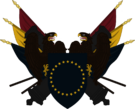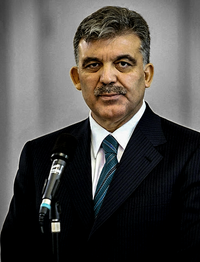President of Carloso
| President of the Executive Council of the Federal Republic of Carloso | |
|---|---|
 Presidential Seal | |
 Presidential Standard | |
| Department of the President | |
| Style | Mr. President (informal) His Excellency (diplomatic) |
| Status | Head of government, of state and commander-in-chief |
| Member of | Executive Council |
| Nominator | National Assembly |
| Term length | 5 years maximum per term, but can hold an unlimited number of terms while commanding the confidence of the majority of the National Assembly. |
| Constituting instrument | Constitution of Carloso |
| Deputy | Deputy President |
| Salary | D£39,366 annually ($85,578) |
| Website | president |
 |
|---|
| This article is part of a series on the politics and government of the Federal Republic of Carloso |
Related topics
|
The President of the Executive Council of the Federal Republic of Carloso, commonly referred to simply as the President of Carloso is the prime minister, head of the Executive Council of Carloso and commander-in-chief of the Carlosian Armed Forces. Carloso differs from the vast majority of other countries that have the Westminister system of government in that it does not have a separate head of state. Instead, the President of Carloso serves ex officio as head of state, as well as being head of government. In addition, the constitutional powers allocated to the President can be considered to be much more generous when they're compared to other countries that have prime ministers. The President can appoint and dismiss ministers at will, without the approval of the National Assembly, though a minister may still be dismissed by a popular motion of no confidence. The President of Carloso is similar to the position of prime minister in that they are still a National Assemblyman during their term and are ultimately answerable to the legislature.
When the new assembly term begins at 12:00 noon on 11 February after a general election, the National Assembly's first order of business is to elect the Chairman of the National Assembly, who acts as speaker. Following this, a ballot is held to elect the President and Deputy President. The President who served in the previous term may nominate themselves to be re-elected; presuming they held onto their seat at the election, or else they must be nominated by two other National Assemblymen. The candidates for President and Deputy President are put forward together and are voted on secretly by National Assemblymen in order of preference in a room adjacent to the main chamber of the National Assembly. Nominees with the lowest number of votes at the end of each count are eliminated and their votes are redistributed. In the end, the pair that attain more than 50% of the votes first are declared to be elected President and Deputy President respectively by the Chairman of the National Assembly. The President then swears allegiance to God and the Carlosian constitution and will then usually announce his appointments to the Executive Council.
The President then serves for the entirety of the assembly term, unless a successful motion of no confidence is passed against them. In this scenario, the President is removed from office and their Deputy President automatically becomes President. They must then immediately nominate their own Deputy President, who will be voted on.
In the case of the death or incapacity (decided by a joint sitting of the High Court and Supreme Court) of the President, the Deputy President is also automatically elected as President and will serve the remainder of the term. If the President dies without appointing a Deputy President, the National Assembly will vote to fill both offices.
Historically, the office has been referred to as President of the Imperial Council during the Carlosian Empire.
